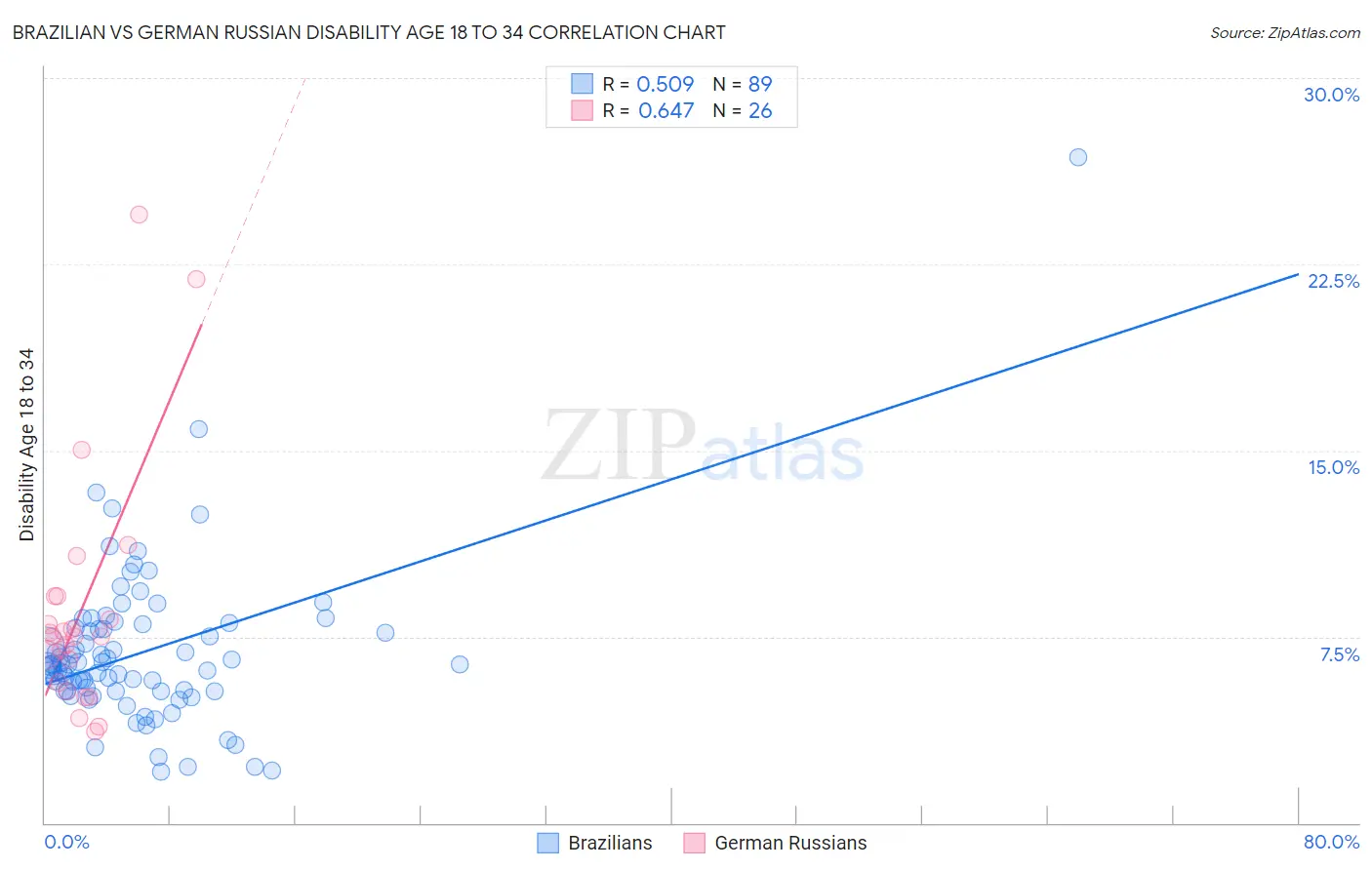Brazilian vs German Russian Disability Age 18 to 34
COMPARE
Brazilian
German Russian
Disability Age 18 to 34
Disability Age 18 to 34 Comparison
Brazilians
German Russians
6.4%
DISABILITY AGE 18 TO 34
89.0/ 100
METRIC RATING
133rd/ 347
METRIC RANK
7.4%
DISABILITY AGE 18 TO 34
0.1/ 100
METRIC RATING
266th/ 347
METRIC RANK
Brazilian vs German Russian Disability Age 18 to 34 Correlation Chart
The statistical analysis conducted on geographies consisting of 323,485,694 people shows a substantial positive correlation between the proportion of Brazilians and percentage of population with a disability between the ages 18 and 35 in the United States with a correlation coefficient (R) of 0.509 and weighted average of 6.4%. Similarly, the statistical analysis conducted on geographies consisting of 96,377,873 people shows a significant positive correlation between the proportion of German Russians and percentage of population with a disability between the ages 18 and 35 in the United States with a correlation coefficient (R) of 0.647 and weighted average of 7.4%, a difference of 15.7%.

Disability Age 18 to 34 Correlation Summary
| Measurement | Brazilian | German Russian |
| Minimum | 2.1% | 3.7% |
| Maximum | 26.8% | 24.5% |
| Range | 24.8% | 20.8% |
| Mean | 6.9% | 8.6% |
| Median | 6.4% | 7.5% |
| Interquartile 25% (IQ1) | 5.3% | 5.6% |
| Interquartile 75% (IQ3) | 7.9% | 9.1% |
| Interquartile Range (IQR) | 2.6% | 3.5% |
| Standard Deviation (Sample) | 3.3% | 4.9% |
| Standard Deviation (Population) | 3.2% | 4.9% |
Similar Demographics by Disability Age 18 to 34
Demographics Similar to Brazilians by Disability Age 18 to 34
In terms of disability age 18 to 34, the demographic groups most similar to Brazilians are Immigrants from Europe (6.4%, a difference of 0.030%), Palestinian (6.4%, a difference of 0.080%), Immigrants from Sweden (6.4%, a difference of 0.090%), Guatemalan (6.4%, a difference of 0.12%), and Immigrants from Honduras (6.4%, a difference of 0.22%).
| Demographics | Rating | Rank | Disability Age 18 to 34 |
| Immigrants | Switzerland | 92.5 /100 | #126 | Exceptional 6.3% |
| West Indians | 92.0 /100 | #127 | Exceptional 6.3% |
| Chinese | 91.9 /100 | #128 | Exceptional 6.3% |
| Immigrants | Italy | 90.5 /100 | #129 | Exceptional 6.3% |
| Immigrants | Dominica | 90.5 /100 | #130 | Exceptional 6.3% |
| Immigrants | Saudi Arabia | 90.4 /100 | #131 | Exceptional 6.3% |
| Guatemalans | 89.6 /100 | #132 | Excellent 6.4% |
| Brazilians | 89.0 /100 | #133 | Excellent 6.4% |
| Immigrants | Europe | 88.8 /100 | #134 | Excellent 6.4% |
| Palestinians | 88.5 /100 | #135 | Excellent 6.4% |
| Immigrants | Sweden | 88.5 /100 | #136 | Excellent 6.4% |
| Immigrants | Honduras | 87.7 /100 | #137 | Excellent 6.4% |
| Spanish American Indians | 87.7 /100 | #138 | Excellent 6.4% |
| Immigrants | Belize | 87.4 /100 | #139 | Excellent 6.4% |
| Immigrants | Fiji | 87.3 /100 | #140 | Excellent 6.4% |
Demographics Similar to German Russians by Disability Age 18 to 34
In terms of disability age 18 to 34, the demographic groups most similar to German Russians are Bangladeshi (7.4%, a difference of 0.060%), Portuguese (7.4%, a difference of 0.14%), Slovene (7.3%, a difference of 0.17%), Basque (7.4%, a difference of 0.18%), and Bermudan (7.3%, a difference of 0.19%).
| Demographics | Rating | Rank | Disability Age 18 to 34 |
| Somalis | 0.2 /100 | #259 | Tragic 7.3% |
| Tohono O'odham | 0.2 /100 | #260 | Tragic 7.3% |
| Northern Europeans | 0.2 /100 | #261 | Tragic 7.3% |
| Canadians | 0.2 /100 | #262 | Tragic 7.3% |
| British | 0.2 /100 | #263 | Tragic 7.3% |
| Bermudans | 0.1 /100 | #264 | Tragic 7.3% |
| Slovenes | 0.1 /100 | #265 | Tragic 7.3% |
| German Russians | 0.1 /100 | #266 | Tragic 7.4% |
| Bangladeshis | 0.1 /100 | #267 | Tragic 7.4% |
| Portuguese | 0.1 /100 | #268 | Tragic 7.4% |
| Basques | 0.1 /100 | #269 | Tragic 7.4% |
| Belgians | 0.1 /100 | #270 | Tragic 7.4% |
| Swiss | 0.1 /100 | #271 | Tragic 7.4% |
| Tsimshian | 0.1 /100 | #272 | Tragic 7.4% |
| Slavs | 0.1 /100 | #273 | Tragic 7.4% |